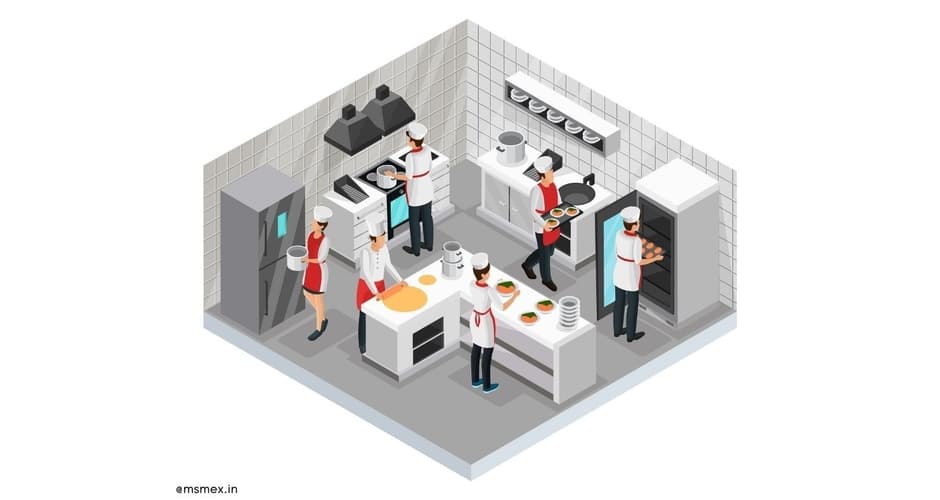Cloud Kitchen is a disruptive business model in the hospitality industry, which has opened up new frontiers of the food business worldwide. There is a reason why Cloud Kitchen Stocks are in demand, and venture capitalists are making a beeline to invest in them.
A Cloud Kitchen is a restaurant kitchen that only serves and delivers online or call-in orders, with no dine-in facility.
Hence, imagine a large hall-type complex, where food is being prepared and shipped, but no customer can sit there and eat. Cloud Kitchen Business is also known as satellite kitchens or dark kitchens. Ghost kitchens and virtual restaurants are also reasonably popular terms for this concept.
Why is Cloud Kitchen Business Becoming Popular?
As per a 2018 survey, around 67% of India’s restaurant owners wish to open a Cloud Kitchen as a new revenue source. The popularity of Cloud Kitchen has soared immensely in the last few years, mainly because of low infrastructure costs and high margins. Since orders are only accepted via online medium, and in some cases via calls, there are no additional overheads to maintain dining space, employ serving staff, and pay steep rentals.
All you need is a kitchen and expert cooks to make food. In most cases, delivery is handled by a third party, thereby saving a tremendous amount of money for the restaurant owners. Even if the kitchen owner decides to deliver the orders on their own-self, the cost is much less than paying rent for the dining space and employing staff members to serve the food.
5 Key Strategies for Building a Cloud Kitchen Business Model
The Cloud Kitchen business model can be explained in just three steps:
- Orders come in via online channels, aggregators, or direct call
- Food is prepared and packed
- Order is delivered by the 3rd party aggregators or the kitchen themselves.
It’s as simple as this. However, several strategies and Cloud Kitchen business models exist to execute these three steps of delivering food to the end-users. These are:
1. The Stand-Alone Cloud Kitchen Business Model: Single Kitchen, Single Brand, and No Storefront
In this strategy, the kitchen is an independent, standalone entity with no association with any 3rd party aggregators or any association with brands. They own and nurture one single brand of the kitchen, and accept orders directly from their customers. This is considered as the original Cloud Kitchen concept, from where this while business model started.
Typically, a standalone and independent Cloud kitchen has 500-600 feet of the kitchen area. Advantages being full control over your Cloud Kitchen Marketing, customer database, and pricing. Scalability is a significant disadvantage, and so is limited cuisine and limited customers.
2. Multi-Brand Cloud Kitchen Business Model with Multiple Outlets
In this strategy, you open several multiple outlets across multiple Cloud Kitchen Locations, and every outlet will develop its multiple brands and, thus, multiple cuisines. This is an advanced and more scalable Cloud Kitchen version, wherein the outlets and brands are created based on data and analytics.
Typically, such a muti-brand, the single kitchen will analyze the user demographics, find out the demands, the feasibility of hyperlocal deliveries, and then based on these data points, open up outlets and multiple brands of cuisines. They usually focus on developing cuisine brands that are not available in that location and maximize their orders.
Such single kitchens will serve a 5-6 km radius for quick delivery, and every brand originating from the single kitchen will focus on one single cuisine.
For example, suppose such a single kitchen outlet comes up in the Lajpat Nagar area in New Delhi. In that case, they can develop multiple brands of cuisines focusing on the locals’ tastes and preferences. One brand can be, say Non-Veg, with a particular focus on Biryani. The other brand from the same outlet can be Chinese cuisines, with a specific focus on noodles and Manchurian varieties. Delivery can be self-fulfilled, or partnership with 3rd party aggregators.
Fasso’s is a good example of this Cloud kitchen business model.
3. Aggregator-Owned, Multi-Brand, Rented Co-Working Cloud Kitchens
In this Cloud Kitchen Business Plan, a 3rd party aggregator will own a shell kitchen with bare minimum facilities such as gas pipes, ventilation, and drainage. Now, this 3rd party aggregator will rent out this space to multiple kitchens, having brands of cuisines. The kitchen owner needs to bring staff, raw materials, and cook the food. Rest everything will be handled by the 3rd party aggregator: menu selection, marketing, delivery, and payments.
Such co-working kitchens are becoming popular because the Cloud kitchen is shared; hence rents are low, and besides cooking food and bringing in raw materials, the kitchen owners need not do any other business activity.
Swiggy is a good example of this model. The order comes to the multi-brand Cloud kitchen via Swiggy, the kitchen owner prepares the food, and Swiggy handles the delivery and payment.
4. Hybrid Model: Aggregator-Owned, Multi-Brand, Rented Co-Working Cloud Kitchens with Storefronts
In this hybrid model, everything is the same as Swiggy’s Aggregator-Owned, Multi-Brand, Rented Co-Working Kitchens model, but with a storefront. Zomato is a pioneer in executing this model since they already had partnerships with restaurants with dine-in facilities. All they did was induce a co-working Cloud Kitchen Model with multiple brands and cuisines, and it scaled up.
In both the hybrid and non-hybrid models, the major disadvantage for the kitchen owners is that they don’t get to access the customer database, and they can’t control the pricing.
5. Outsourced & Managed Cloud Kitchen Business Model
This is a relatively new Cloud kitchen business concept, wherein the entire process of taking orders, preparing the food and delivery is outsourced to a third party. US-based Kitopi has pioneered this new Cloud kitchen business model and scaling it fast.
This is how it works –
A customer orders a food item from a restaurant called Tasty Foods. This order can come via Tasty Food’s website, social media, or Kitopi’s call center. Kitopi has already bought the raw materials and has a basic kitchen facility. Kitopi pre-prepares the food and sends it to the kitchen of Tasty Foods. Chefs at Tasty Foods give the final touches and informs Kitopi. Kitopi delivery partners pick up the food and deliver it.
It can be described as a hybrid model between traditional restaurant business, Cloud Kitchen Concept, and outsourced food operations.
Conclusion
The very idea of Cloud Kitchen Business is mammoth, and there exist several layers and more layers within each strategy of building a new Cloud Kitchen. You can consult with an expert in Cloud Kitchen Business right now, at MSMEx and take your plans for a Cloud Kitchen to the next level. MSMEx provides a startup learning platform for MSMEs and small businesses to connect and consult with business strategy and growth experts.
Related Read About
- What is APEDA Certificate? How to Register with APEDA & Start Food Exports?
- What Are The Business Licenses? Eligibility, Documents & How To Apply? Explore The List Of Business License & Permits In India
- What Is An MSME Certificate? How To Apply For Udyam Registration Certificate? Benefits, Eligibility & Requirements
- What Is MSME Udyam Registration? Step-By-Step Process Of MSME Registration And Its 10 Benefits
- How To Register As A Startup Company In India? Registration Benefits & Documents Required
- Registering A Business In India – Registration Of A Small Scale And A Large Scale Business
- 7 Best Business Ideas with Low Investment for Indian Entrepreneurs
- Importance Of Idea Validation For Your Business Startup – Know Its Pillars And How To Validate Your Idea






